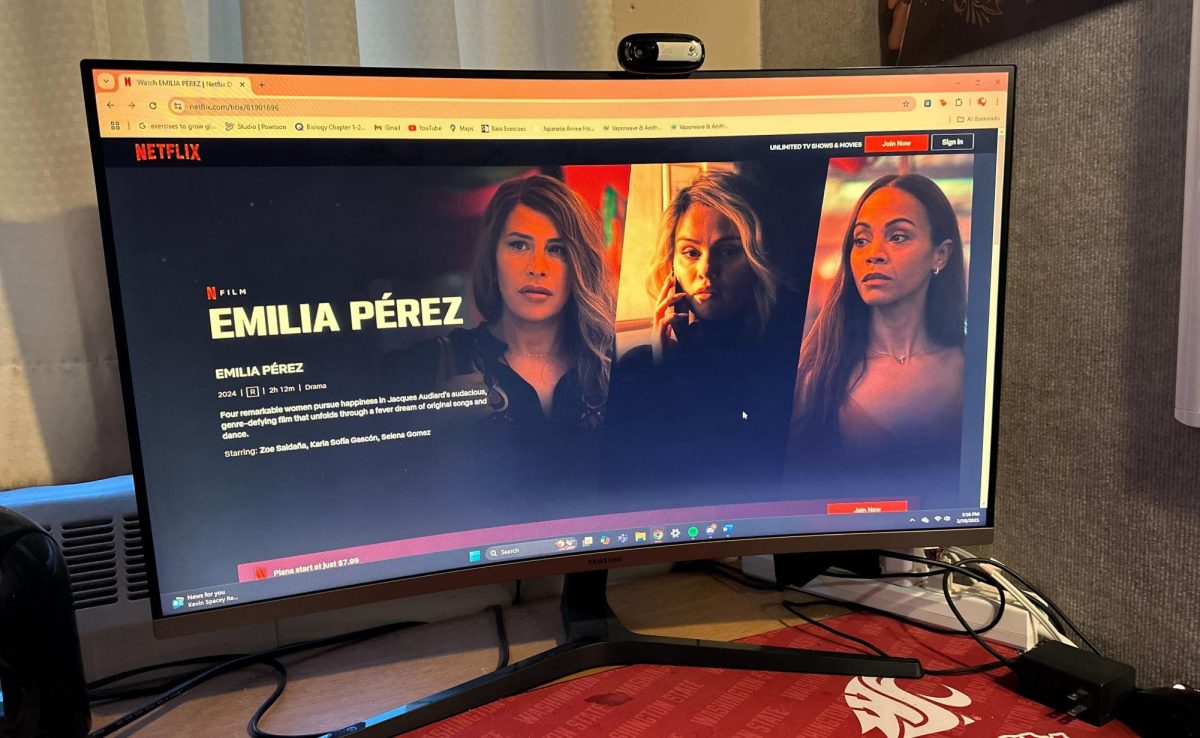With 13 Oscar nominations, you would expect “Emilia Pérez” to be a knockout film, universally loved and critically acclaimed—but that could not be further from the truth.
With a Rotten Tomatoes audience score of 17% and an IMDB rating of 5.5, the film that holds the same amount of Oscar nominations as last year’s Oppenheimer is a clear failure in the court of public opinion. Critics, however, laud the film as progressive and revolutionary; where was communication lost between them and the audience?
If you aren’t aware of Emilia Pérez’s plotline, it is simply as follows: a lawyer in Mexico City, Mexico, Rita Mora (Zoe Saldaña), helps a former Mexican cartel kingpin fake their death and finally transitions into a woman, Emilia Pérez (Karla Sofia Gascón). With her newfound life, Emilia helps victims of the cartel system in Mexico but finds that her past still follows her. All of this is done in the form of a musical.
Online users on various social media platforms including X, YouTube and Instagram have expressed their frustrations with the film on every aspect of its intended progressiveness.
User @ghostamanita on X said that the movie is “bigoted, racist, transphobic and extremely tone deaf to a situation that has brought millions of people suffering.”
Jessie Gender, a transgender YouTuber, also released a 2-hour-long video titled “The Racist Cisgender Nonsense of Emilia Perez” which examines its flaws and problems in- depth.
Furthermore, Mexican and transgender individuals alike have come forward on critic sites to lament how “Emilia Pérez” handles their identities. [individuals are mentioned and cited below]
GLAAD, for example, released a lengthy compilation article displaying numerous reviews from trans critics who slam the movie as offensive and a “step back” for trans representation.
“It is an idea of transness so completely from the cis imagination,” Fran Tirado, a trans journalist and critic, said on Them.
Jacques Audiard, a cis French director, is the subject of much of the backlash. Many trans people have cited how “cis” the movie feels, with its cliches and stereotypes that seem to often follow trans people in film.
Audiard is also heavily criticized for his portrayal of Mexico. Mexcians have pointed out a vast amount of inaccuracies in the setting and feeling of their home. This is no surprise, as Audiard did not actually shoot the film in Mexico—every frame was shot in France.
Even small logistical things, however, make clear of the team’s lack of research into Mexican culture. Ces Heredia, a writer and Mexican national, pointed out in an article from LatinaMediaCo that the film opens with a trial in Mexico–and there is a jury. It sounds fine until you realize that the Mexican judicial system does not have juries. This is only one inaccuracy in the film, yet it seems like a major oversight. It emphasizes the lack of Mexican presence on Audiard’s team.
“Emilia Pérez is yet another example of Mexican struggles and culture being exploited for the benefit and ego of non-Mexicans,” Heredia said in her article.
The other major issue audiences have with the film is the lack of Mexican actors playing Mexican roles. None of the three major roles are played by Mexican actresses. The protagonist herself, Gascan, was born in Spain. Audiences ask the question, why were Mexican actors not cast in the film?
A clip of casting director Carla Hool recently came under fire on social media, where she said, “we wanted to keep it really authentic, but at the end of the day, the best actors who embodied these characters are the ones that are right here” (referring to Zoe Saldaña, Selena Gomez, and Karla Sofia Gascón).
The main problem with not casting Mexican actresses for these roles was not necessarily that their identities did not match, but with their accents, according to audiences.
While Saldaña and Gascón are both from Spanish-speaking countries, they have their country’s accents; Saldaña’s character was ret-conned to have been from the Dominican Republic, but Gascón’s character is concretely Mexican. Even with training in the accent, audiences still found inaccuracies in Gascón’s performance as the native Mexican Emilia Pérez.
Further criticized, however, is Selena Gomez’s Spanish performance. Many fluent Spanish speakers said they could not understand a word of what she was saying or singing, which is a huge problem when shooting for authenticity.
The film has a slew of other issues thoroughly picked over by audiences, especially in its negatively-reviewed music which many have said makes the film much more absurd, but not quite in a satiric, lighthearted way.
The Academy seems to favor this film heavily, though, soaring ahead of huge hits like “Wicked,” another musical, in terms of nominations. Why is that?
Progressiveness is sought-after nowadays in the Oscar world and “revolutionary” films are almost always on the docket for Best Picture and other categories. The Academy saw “Emilia Pérez” and took its face-value elements: a trans actress, set in Mexico, and the “moral” that people deserve a second chance if they atone. What they did not account for, though, were the inaccuracies and problems it has with representing these groups.
Thus, “Emilia Pérez” becomes what the internet deems as “Oscar bait”—a film that tries to prod for the favored tropes that typically win Best Picture and other major categories.
It is unclear if this favor the Academy is giving the film will be halted at nominations or if it will completely sweep every category it is in, but Mexican and transgender people have expressed their concerns about rewarding it, lest it inspire similar movies.
For all its flaws, “Emilia Pérez” has become the overwhelming least favorite of those following the Oscar race, who hope each category has a hero that can defeat the comically evil villain.









